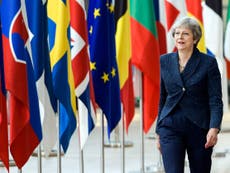Can’t we, just for once, hear from some sensible Brexiteers?
The European Research Group of Conservative MPs, which Rees-Mogg chairs, gives every impression of behaving like Tony Benn’s supporters in the 1980s. They are willing to put Britain’s departure from the EU at risk by opposing what they regard as May’s imperfect Brexit

Where are the moderate Brexiteers? There is a well of silence in the middle of the national debate, which seems to be a shouting match between the strident Leavers, who want to leave without a deal, and the vocal Remainers, who want to reverse Brexit altogether. Where are the champions of the middle ground: the people who voted Leave and who are not doctrinaire about observing EU market rules; or the people who voted Remain and who accept the result of the referendum?
One reason for the vacuum is that the obvious spokesperson for moderate Brexitism is Theresa May herself. She repeatedly insists that the UK will leave, and that her government is absolutely committed to “respecting the will of the British people and delivering on the vote”. But she rarely says why.
She is in a bad position to argue for her plan, which is to leave the EU but stay in a close economic partnership with it. Not just because she thought, before the referendum, that staying in the EU was in the national interest, and then overcorrected to align herself with the rhetoric of global Britannia when she unexpectedly became prime minister. But also because advocacy and persuasion are missing from her armoury.
In the alternating opposite characters that become our leaders, she is a dogged administrator rather than a teacher and guide. (Working backwards: Cameron, teacher; Brown, administrator; Blair, teacher; Major, administrator; Thatcher, teacher ...) She is ill equipped, therefore, to make the case for staying in what used to be called the common market, but taking Britain out of the political union. That is essentially the deal she is trying to negotiate, but all the noise is being made by those who want to be completely in or completely out of both.
Yet there is a good case for a middle position. One of the few people who expressed it well was Robert Tombs, the Cambridge professor and author of The English and Their History. He argued that most peoples of Europe are sceptical about the EU, but that the British have always been more so – and that the decision to join in 1973 was the product of temporary economic crises. “Yet it was based on a fundamental misconception,” wrote Tombs. “When measured over the whole half century from 1950 to 2000, Britain’s economic performance was no different from the European norm.”
But Professor Tombs, however brilliant, is a retired academic, not a political leader. And even he has fallen victim to the sectarianism of many pro-Brexit activists, coming out against Theresa May’s Chequers plan in terms that are indistinguishable from those of Boris Johnson and Jacob Rees-Mogg.
There is no way forward down that cul-de-sac. The European Research Group of Conservative MPs, which Rees-Mogg chairs, gives every impression of behaving like Tony Benn’s supporters in the 1980s. They are more interested in doctrinal purity – what they call a “clean” Brexit – than in securing their first-stage objective. They are willing to put Britain’s departure from the EU at risk by opposing what they regard as May’s imperfect Brexit.
So who will make the case for getting out of the political structures of the EU while maintaining close economic cooperation? Who will speak up for the centre ground of the British electorate, which would prefer what Johnson calls “Brexit in name only” to staying in the EU?
Curiously, this seems to be the position occupied by two potentially persuasive leaders: Jeremy Corbyn and Michael Gove. Corbyn argues for a customs union and close regulatory alignment, while Gove is believed to argue – although he has not done so publicly – that the important thing is to get out and sort out the details later.
It just shows how Brexit has disrupted all assumptions about where the centre ground in British politics lies. All those candidates for dinner with Vince Cable to discuss a new centre party – Blair, Clegg, Major, Clarke – are on the “stop Brexit” extreme of the European debate.
Whereas the two muffled spokespeople for a moderate Brexit, Corbyn and Gove, represent the supposed extremes of left and right in their respective parties. But if an advocate for a centrist Brexit doesn’t find a voice soon, we will be left with only extreme choices.



Join our commenting forum
Join thought-provoking conversations, follow other Independent readers and see their replies